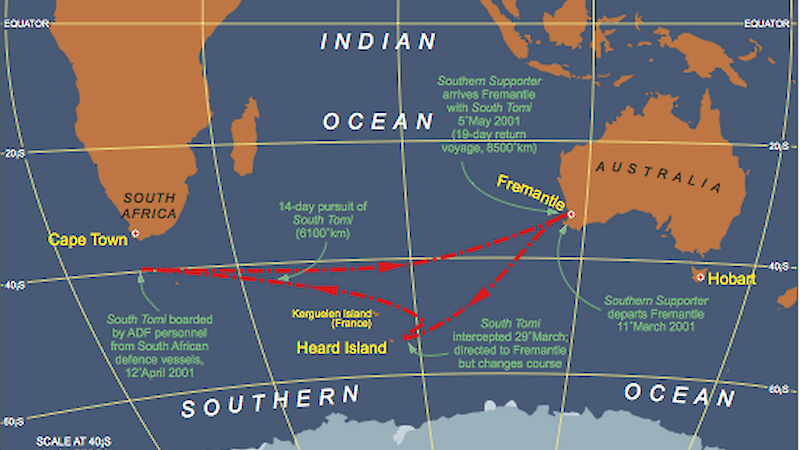In May this year considerable media attention was given to the interception, in a remote corner of the Southern Ocean, of an unknown foreign fishing vessel suspected of illegal fishing in Australian waters around Heard Island.
On 12 April 2001 the Togo-flagged South Tomi was boarded by defence personnel and fisheries officers, after pursuing the vessel 6100km across the Southern Indian Ocean. It was carrying a haul of toothfish worth $1.5 million.
Australia has sovereignty over a 200nm Exclusive Economic Zone around Heard Island. In late 1997 and early 1998 three vessels were apprehended by the frigates HMAS ANZAC and HMAS Newcastle. Following these encounters the Government funded further patrols using civil and defence resources and since 1998 these have formed a critical part of combating illegal fishing in the region.
On 29 March the civilian patrol vessel Southern Supporter challenged the South Tomi which was suspected of fishing illegally. The vessel initially obeyed an order to sail to Fremantle, over 4000 kilometres northeast, but once outside Australian waters turned northwest. Southern Supporter commenced a hot pursuit lasting 14 days.
As South Tomi's ultimate destination was not clear, France and South Africa — which have interests in the area- were contacted. Both offered assistance and as South Tomi headed for the Atlantic, South Africa's President approved Cape Town as a base for an interception. Australian personnel flew to Cape Town to join South African navy vessels. South Tomi was boarded on the high seas 320nm south of Cape Town and then, accompanied by Southern Supporter, steamed 8,500km to Fremantle arriving on 5 May.
Since returning to Australia South Tomi's master has been charged with offences related to fishing illegally and disobeying the direction of a fisheries officer. The master has pleaded guilty to the illegal fishing charges and the other charge has been dismissed. Sentencing is expected on 11 October.
Australian authorities will seek to recover the costs of the chase, including monies paid to South Africa, and establish who are the beneficial owners of the South Tomi.
The South Tomi incident is notable for the outstanding cooperation from other countries and the logistics involved. It is a graphic example of the strong commitment to combating illegal fishing by Australia and other parties to CCAMLR.
Despite the detention of the South Tomi and many arrests of foreign vessels by France, the risk of further illegal fishing in the region remains high. Australia will continue to work in CCAMLR and in other forums to implement effective measures to combat illegal, unreported and unregulated fishing in the CCAMLR waters.
Ian Hay
Antarctic Treaty and Government,
Australian Antarctic Division
‘Hot pursuit’ — more than a cliché
‘Hot pursuit’ is not a catchy phrase invented by a journalist to invoke a sense of high drama, it has a legal meaning within the UN Convention on the Law of the Sea. The right to undertake ‘hot pursuit’ is detailed in Article 111 which provides that ‘the hot pursuit of a foreign ship may be undertaken when the competent authorities of the coastal State have good reason to believe that the ship has violated laws and regulations of that State.’ Article 111 requires that the offending vessel be ordered to stop, that the pursuit not be interrupted and only conducted by warships, military aircraft, or other ships or aircraft clearly marked and identifiable as being on government service and authorised to that effect.

